2016年广东省高职高考英语真题卷-附答案
2016年广东省高考英语试卷
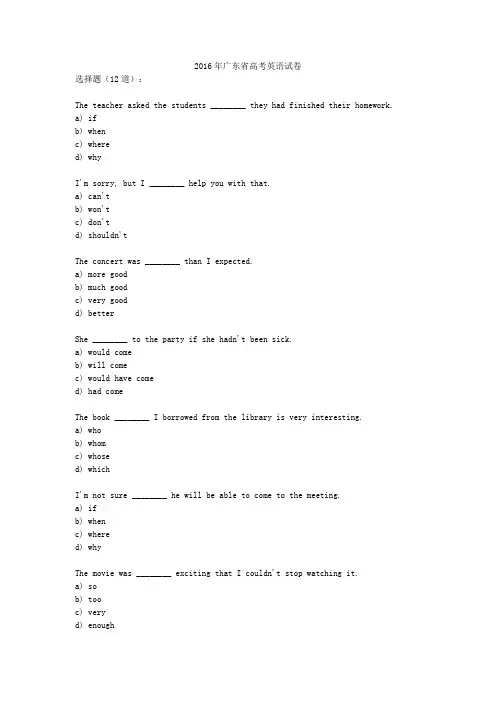
2016年广东省高考英语试卷选择题(12道):The teacher asked the students ________ they had finished their homework.a) ifb) whenc) whered) whyI'm sorry, but I ________ help you with that.a) can'tb) won'tc) don'td) shouldn'tThe concert was ________ than I expected.a) more goodb) much goodc) very goodd) betterShe ________ to the party if she hadn't been sick.a) would comeb) will comec) would have comed) had comeThe book ________ I borrowed from the library is very interesting.a) whob) whomc) whosed) whichI'm not sure ________ he will be able to come to the meeting.a) ifb) whenc) whered) whyThe movie was ________ exciting that I couldn't stop watching it.a) sob) tooc) veryd) enoughI ________ to the store to buy some milk.a) can'tb) won'tc) don'td) shouldn'tThe weather is ________ today than it was yesterday.a) more hotb) much hotc) very hotd) hotterShe ________ the job if she had studied harder.a) would getb) will getc) would have gottend) had gottenThe car ________ I bought last week is very fast.a) whob) whomc) whosed) whichThe party was ________ fun that I didn't want to leave.a) sob) tooc) veryd) enough填空题(8道):I ________ to the store to buy some bread.She ________ to the party if she hadn't been busy.The book ________ I borrowed from the library is very interesting. The concert was ________ than I expected.I'm not sure ________ he will be able to come to the meeting.The weather is ________ today than it was yesterday.The movie was ________ exciting that I couldn't stop watching it. The car ________ I bought last week is very fast.。
2016年广东省高职高考英语真题卷-附答案(同名59)
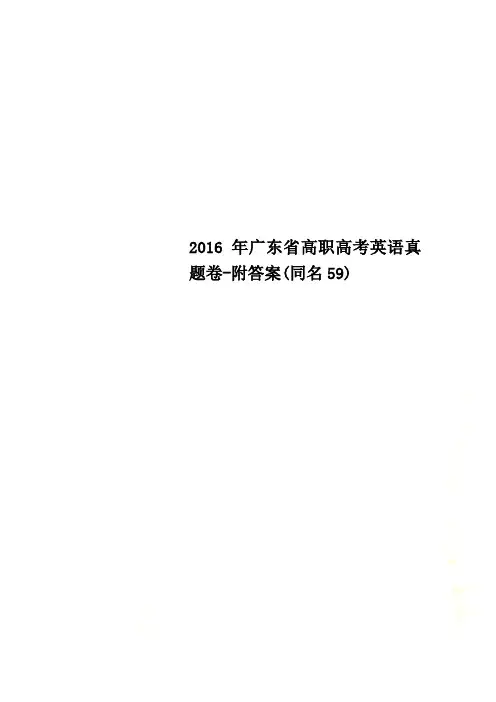
2016年广东省高职高考英语真题卷-附答案(同名59)试卷类型:A 2016年广东省高等职业院校招收中等职业学校毕业生考试英语本试卷共10页,81小题,满分150分。
考试用时120分钟。
注意事项:1.答卷前,考生务必用黑色字迹的钢笔或签字笔将自己的姓名和考生号、考场号、座位号填写在答题卡上。
用2B铅笔将试卷类型(A)填涂在答题卡相应位置上。
将条形码横贴在答题卡右上角“条形码粘贴处”。
2.选择题每小题选出答案后,用2B铅笔把答题卡上对应题目选项的答案信息点涂黑,如需改动,用橡皮擦干净后,再选涂其他答案,答案不能答在试卷上。
3.非选择题必须用黑色字迹钢笔或签字笔作答,答案必须写在答题卡各题目指定区域内相应位置上;如需改动,先划掉原来的答案,然后再写上新的答案;不准使用铅笔和涂改液。
不按以上要求作答的答案无效。
4.考生必须保持答题卡的整洁。
考试结束后,将试卷和答题卡一并交回。
Ⅰ.补全对话( 5小题,共10分)阅读下列简短对话;从A、B、C、D中选出最佳答案,将对话补全。
例:M: How's everything going?W: Fine, thanks. How are you doing?M: _________________.A. I'm 16 nowB. Yes, it is goodC. See you thenD. Oh, not too bad答案是D。
1. M: Would you like to go to the park withus?W: _____, but I have to go shopping withMom today.A. Sorry, I can’t goB.You are rightC. I’d love toD.Yes, I do2. M: Hi, Alice! _____?W: Not bad, thanks.A. Where were youB. How was your weekendC. Can I help youD. Did you see the film3. M: Do you know Lewis?W: _____?M: He is very tall and he’s got quite short, brown hair.A. What does he look likeB. Where is he fromC. How old is heD. How is he now4. M: I’ve looked for my dog everywhere butI still can’t find it.W: _________________________.A. You are welcomeB. Good ideaC. I don’t think soD.I’m sorry to hear that5. M: Hello, _____?W: Sorry. There is no one named Tracy. You must have the wrong number.A. Who is thatB. What’s the matter, TracyC. Is that Tracy speakingD. What’s your nameⅡ.词汇与语法(30小题,共45分)A)从A、B、C、D中选出句中画线的单词或词组的意义。
广东高职高考英语试题答案(2)
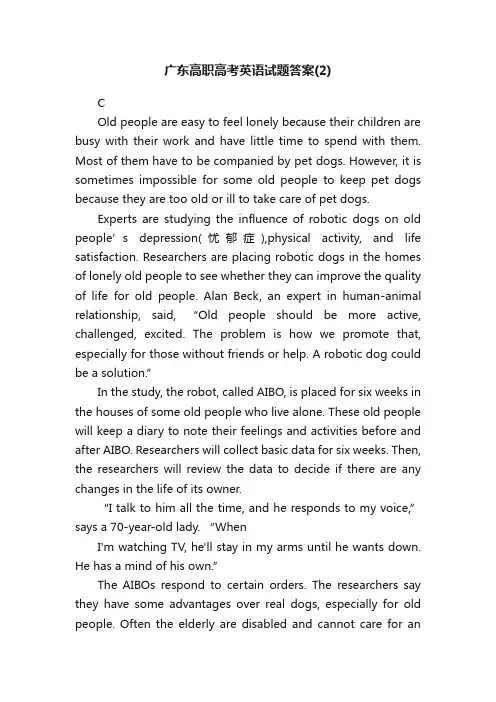
广东高职高考英语试题答案(2)COld people are easy to feel lonely because their children are busy with their work and have little time to spend with them. Most of them have to be companied by pet dogs. However, it is sometimes impossible for some old people to keep pet dogs because they are too old or ill to take care of pet dogs.Experts are studying the influence of robotic dogs on old people’s depression(忧郁症),physical activity, and life satisfaction. Researchers are placing robotic dogs in the homes of lonely old people to see whether they can improve the quality of life for old people. Alan Beck, an expert in human-animal relationship, said, “Old people should be more active, challenged, excited. The problem is how we promote that, especially for those without friends or help. A robotic dog could be a solution.”In the study, the robot, called AIBO, is placed for six weeks in the houses of some old people who live alone. These old people will keep a diary to note their feelings and activities before and after AIBO. Researchers will collect basic data for six weeks. Then, the researchers will review the data to decide if there are any changes in the life of its owner.“I talk to him all the time, and he responds to my voice,” says a 70-year-old lady. “WhenI'm watching TV, he'll stay in my arms until he wants down. He has a mind of his own.”The AIBOs respond to certain orders. The researchers say they have some advantages over real dogs, especially for old people. Often the elderly are disabled and cannot care for ananimal by walking it or playing with it. A robotic dog needn’t any exercise and feeding concerns.“At the beginning, it was believed that no one would prefer the robotic dog because it was metal and not furry (毛茸茸的) ,”Beck says. “But it’s amazing how quickly we have given up that belief.”Hopefully, these robotic pets could become a more valuable health helper. They will record their masters’ blood pressure, oxygen levels, or heart rhythms. AIBOs may even one day have games that can help exciting older people’s minds.63.From the passage we can learn that old people can easily feel lonely because_____.A. their children don’t like to stay with themB. they don’t have pet dogsC. their children are too busy to stay with themD. they don’t have robotic dogs64. The underlined word “note” in the third paragraph means “_____”.A. to give noticeB. to pay attentionC. to write downD. to talk about65. The author may believe that the future robotic dogs can_________.A. help excit old people’s mindsB. take the place of real dogsC. cure a lot of serious diseasesD. change people’s beliefs66. Which is the best title for the passage ?A. Pet Dogs Need Robotic DogsB. Old People Need Robotic DogsC. All People Need Robotic DogsD. Researchers Need Robotic DogsDAttention to detail is something everyone can and should do — especially in tight job market.Bob Crossley, a human-resources expert notices this in the job applications that come acros s his desk every day. “It’s amazing how many candidates eliminate (淘汰) themselves,” he says. “Resumes (简历) arrive with faults. Some candidates don’t bother to spell the company’s name correctly. Once I see a mistake, I refuse the candidates,” Crossley concludes,” If they cannot take care of these details, why should we trust them with a job?”Can we pay too much attention to details? Absolutely not.Perfectionists(完美主义者) struggle over little things instead of something larger they work toward. “To keep from losing the forest for the trees,” says Charles Garfield, the professor at the University of California, San Francisco, “We must constantly ask ourselves how the details we’re working will influence the larger picture. If they don’t, we should drop them an d move to something else.”Garfield compares this process to his work as a computer scientist at NASA. “The Apollo II moon launch was slightly off-course 90 percent of the time,” says Garfield. “But a successful landing was still likely because we knew the exact position of our goal. This allowed us to make adjustments as necessary.” Knowing where to go helps us judge the importance of every task we undertake.Again and again, we see that by doing little things within our grasp well, large rewardsfollow.67. According to the passage, some job applicants wererefused because they are ________.A. too limitedly educated to write a perfect resumeB. so careless that they make some spelling mistakes in their resumeC. so careless that they forget the company’s nameD. too foolish to spell the company’s name correctly68. From the passage, we can infer that a perfectionist will _________.A. change their goals as the situations changeB. lose their jobs by paying too much attention to detailsC. pay attention to details as much as to their major goalsD. pay attention to details more than their major goals69. Garfield makes his opinion believable by _________.A. giving ideas of expertsB. offering examples of resumesC. providing an example of his work.D. showing the results of experiments70. Which of the following best shows the structure of the passage?I: Introduction P:Point Sp: Sub-point (次要点)C: Conclusion第二节(共5 小题;每小题2 分,共10 分)根据短文内容,从短文后的选项中选出能填入空白处的最佳选项。
2016年广东高考英语试卷真题
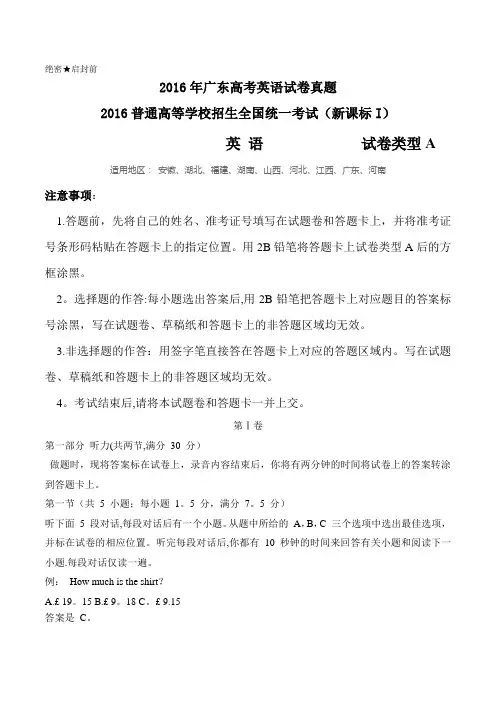
绝密★启封前2016年广东高考英语试卷真题2016普通高等学校招生全国统一考试(新课标I)英语试卷类型A 适用地区:安徽、湖北、福建、湖南、山西、河北、江西、广东、河南注意事项:1.答题前,先将自己的姓名、准考证号填写在试题卷和答题卡上,并将准考证号条形码粘贴在答题卡上的指定位置。
用2B铅笔将答题卡上试卷类型A后的方框涂黑。
2。
选择题的作答:每小题选出答案后,用2B铅笔把答题卡上对应题目的答案标号涂黑,写在试题卷、草稿纸和答题卡上的非答题区域均无效。
3.非选择题的作答:用签字笔直接答在答题卡上对应的答题区域内。
写在试题卷、草稿纸和答题卡上的非答题区域均无效。
4。
考试结束后,请将本试题卷和答题卡一并上交。
第Ⅰ卷第一部分听力(共两节,满分30 分)做题时,现将答案标在试卷上,录音内容结束后,你将有两分钟的时间将试卷上的答案转涂到答题卡上。
第一节(共 5 小题;每小题1。
5 分,满分7。
5 分)听下面 5 段对话,每段对话后有一个小题。
从题中所给的A,B,C 三个选项中选出最佳选项,并标在试卷的相应位置。
听完每段对话后,你都有10 秒钟的时间来回答有关小题和阅读下一小题.每段对话仅读一遍。
例:How much is the shirt?A.£ 19。
15B.£ 9。
18 C。
£ 9.15答案是C。
1。
What are the speakers talking about?A。
Having a birthday party。
B. Doing some exercise。
C. Getting Lydia a gift2.What is the woman going to do?A. Help the man.B. Take a bus.C. Get a camera3.What does the woman suggest the man do?A. Tell Kate to stop.B。
2016年高考广东英语高考真题
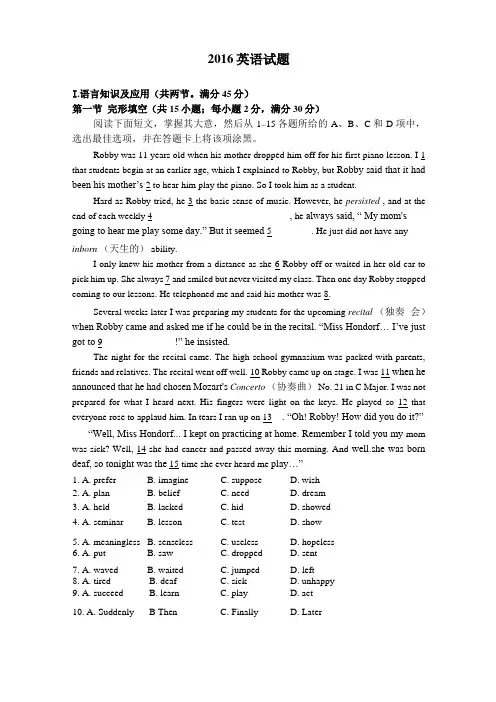
2016英语试题I.语言知识及应用(共两节。
满分45分)第一节完形填空(共15小题;每小题2分,满分30分)阅读下面短文,掌握其大意,然后从1〜15各题所给的A、B、C和D项中,选出最佳选项,并在答题卡上将该项涂黑。
Robby was 11 years old when his mother dropped him off for his first piano lesson. I 1 that students begin at an earlier age, which I explained to Robby, but Robby said that it had been his mother’s 2 to hear him play the piano. So I took him as a student.Hard as Robby tried, he 3 the basic sense of music. However, he persisted , and at the end of each weekly 4 , he always said, “ My mom's going to hear me play some day.” But it seemed 5 . He just did not have any inborn(天生的) ability.I only knew his mother from a distance as she 6 Robby off or waited in her old car to pick him up. She always 7 and smiled but never visited my class. Then one day Robby stopped coming to our lessons. He telephoned me and said his mother was 8 .Several weeks later I was preparing my students for the upcoming recital(独奏会)when Robby came and asked me if he could be in the recital. “Miss Hondorf… I’ve just got to 9 !” he insisted.The night for the recital came. The high school gymnasium was packed with parents, friends and relatives. The recital went off well. 10 Robby came up on stage. I was 11 when he announced that he had chosen Mozart's Concerto(协奏曲) No. 21 in C Major. I was not prepared for what I heard next. His fingers were light on the keys. He played so 12 that everyone rose to applaud him. In tears I ran up on 13 . “Oh! Robby! How did you do it?”“Well, Miss Hondorf... I kept on practicing at hom e. Remember I told you my mom was sick? Well, 14 she had cancer and passed away this morning. And well.she was born deaf, so tonight was the 15 time she ever heard me play…”1. A. prefer B. imagine C. suppose D. wish2. A. plan B. belief C. need D. dream3. A. held B. lacked C. hid D. showed4. A. seminar B. lesson C. test D. show5. A. meaningless B. senseless C. useless D. hopeless6. A. put B. saw C. dropped D. sent7. A. waved B. waited C. jumped D. left8. A. tired B. deaf C. sick D. unhappy9. A. succeed B. learn C. play D. act10. A. Suddenly B Then C. Finally D. Later11. A. surprised B. puzzled C. disappointed D. annoyed12. A. badly B. hardly C. differently D. wonderfully13. A. platform B. stairs C. stage D. floor14. A. unluckily B. therefore C. however D. actually15. A. best B. first C. last D. worst第二节语法填空(共10小题;每小题1.5分,满分15分)阅读下面短文,按照句子结构的语法性和上下文连贯的要求,在空格处填入一个适当的词或使用括号中词语的正确形式填空,并将答案填写在答题卡括号为16-25的相应位置上。
2016年广东省高等职业院校招收中等职业学校毕业生考试英语.doc
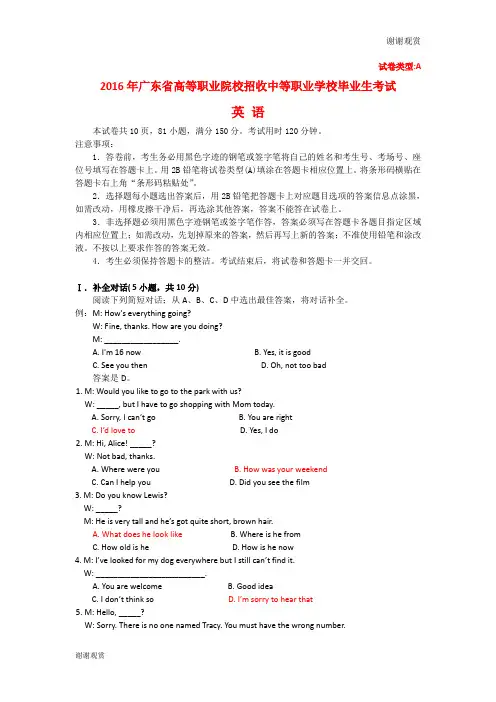
试卷类型:A 2016年广东省高等职业院校招收中等职业学校毕业生考试英语本试卷共10页,81小题,满分150分。
考试用时120分钟。
注意事项:1.答卷前,考生务必用黑色字迹的钢笔或签字笔将自己的姓名和考生号、考场号、座位号填写在答题卡上。
用2B铅笔将试卷类型(A)填涂在答题卡相应位置上。
将条形码横贴在答题卡右上角“条形码粘贴处”。
2.选择题每小题选出答案后,用2B铅笔把答题卡上对应题目选项的答案信息点涂黑,如需改动,用橡皮擦干净后,再选涂其他答案,答案不能答在试卷上。
3.非选择题必须用黑色字迹钢笔或签字笔作答,答案必须写在答题卡各题目指定区域内相应位置上;如需改动,先划掉原来的答案,然后再写上新的答案;不准使用铅笔和涂改液。
不按以上要求作答的答案无效。
4.考生必须保持答题卡的整洁。
考试结束后,将试卷和答题卡一并交回。
Ⅰ.补全对话( 5小题,共10分)阅读下列简短对话;从A、B、C、D中选出最佳答案,将对话补全。
例:M: How's everything going?W: Fine, thanks. How are you doing?M: _________________.A. I'm 16 nowB. Yes, it is goodC. See you thenD. Oh, not too bad答案是D。
1. M: Would you like to go to the park with us?W: _____, but I have to go shopping with Mom today.A. Sorry, I can’t goB. You are rightC. I’d love toD. Yes, I do2. M: Hi, Alice! _____?W: Not bad, thanks.A. Where were youB. How was your weekendC. Can I help youD. Did you see the film3. M: Do you know Lewis?W: _____?M: He is very tall and he’s got quite short, brown hair.A. What does he look likeB. Where is he fromC. How old is heD. How is he now4. M: I’ve looked for my dog everywhere but I still can’t find it.W: _________________________.A. You are welcomeB. Good ideaC. I don’t think soD. I’m sorry to hear that5. M: Hello, _____?W: Sorry. There is no one named Tracy. You must have the wrong number.A. Who is thatB. What’s the matter, TracyC. Is that Tracy speakingD. What’s your nameⅡ.词汇与语法(30小题,共45分)A)从A、B、C、D中选出句中画线的单词或词组的意义。
2016广东高考答案英语
2016广东高考答案英语【篇一:2016年全国(广东)英语高考试题与答案】6普通高等学校招生全国统一考试(新课标i)英语试卷类型a第Ⅰ卷第二部分阅读理解(共两节,满分40分)第一节(共15小题:每小题2分,满分30分)阅读下列短文,从每题所给的四个选项(a、b、c和d)中选出最佳选项,并在答题卡上将该项涂黑。
ayou probably know who marie curie was, but you may not have heard of rachel carson. of the outstanding ladies listed below, who do you think was the most important woman of the past 100 years?jane addams (1860-1935)anyone who has ever been helped by a social worker has jane addams to thank. addams helped the poor and worked for peace. she encouraged a sense of community(社区) by creating shelters and promoting education and services for people in need. in 1931, addams became the first american woman to win the nobel peace prize.rachel carson (1907-1964)if it weren’t for rachel carson, the environmental movement might not exist today. her popular 1962 book silent spring raised awareness of the dangers of pollution and the harmful effects of chemicals o n humans and on the world’s lakes and oceans.sandra day o’connor (1930-present)when sandra day o’connor finished third in her class at stanford law school, in 1952, she could not find work at a law firm because she was a woman. she became an arizona state senator(参议员) and ,in 1981, the first woman to join the u. s. supreme court. o’connor gave the deciding vote in many important cases during her 24 years on the top court.rosa parks (1913-2005)on december 1, 1955, in montgomery, alabama, rasa parks would not give up her seat on a bus to a passenger. her simple act landed parks in prison. but it also set off the montgomerybus boycott. it lasted for more than a year, and kicked off the civil-rights movement. ―the only tired i was, was tired of giving in,‖ said parks. 21. what is jane addams noted for in history?a. her social work.b. her teaching skills.c. her efforts to win a prize.d. her community background.22. what was the reason for o’connor’s being rejected by the law firm?a. her lack of proper training in law.b. her little work experience in court.c. the discrimination against women.d. the poor financial conditions.23. who made a great contribution to the civil-rights movement in the u.s.?a. jane addams. c. sandra day o’connor.b. rachel carson. d. ross parks.24. what can we infer about the women mentioned in the text?a. they are highly educated. c. they are pioneers.b. they are truly creative. d. they are peace-lovers.bgrandparents answer a callas a third-generation native of brownsville, texas, mildred garza never planned to move away. even when her daughter and son asked her to move to san antonio to help with their children, she politely refused. only after a year of friendly discussion did ms. garza finally say yes. that was four years ago. today all three generations regard the move as a success, giving them a closer relationship than they would have had in separate cities.grandparents in the american family. two-thirds believe more familie s will follow the example of obama’s family.―in the 1960s we were all a little wild and couldn’t get away from home far enough or fast enough to prove we could do it on our own,‖ says christine crosby, publisher of grand, a magazine for grandparents. ―we now realize how important family is and how important it is to be near them, especially when you’re raising children.‖moving is not for everyone. almost every grandparent wants to be with his or her grandchildren and is willing to make sacrifices, but sometimes it is wiser to say no and visit frequently instead. having your grandchildren far away is hard,especially knowing your adult child is struggling, but giving up the life you know may be harder.25. why was garza’s move a success?a. it strengthened her family ties.b. it improved her living conditions.c. it enabled her make more friends.d. it helped her know more new places.26. what was the reaction of the public to mrs. robinson’s decision?a. 17% expressed their support for it.b. few people responded sympathetically.c. 83% believed it had a bad influence.d. the majority thought it was a trend. 27. what did crosby say about people in the 1960s?a. they were unsure of themselves.b. they were eager to raise more children.c. they wanted to live away from their parents.d. they had little respect for their grandparents.28. what does the author suggest the grandparents do in the last paragraph?a. make decisions in the best interests of their own.b. asktheir children to pay more visits to them. c. sacrifice for their struggling children. d. get to know themselves better.c’ve done 89 trips — of those , 51 have been abroad, i have 42 hours to carry stem cells (干细胞) in my little box because i’ve got two ice packs and that’s how long they last. in all, from the time the stem cells are harvested from a donor (捐献者) to the time they can be implanted in the patient, we’ve got 72 hours at most, so i am always conscious of time.i had one trip last year where i was caught by a hurricane in america. i picked up the stem cells in providence, rhode island, and was meant to fly to washington then back to london. but when i arrived at the check-in desk at providence, the lady on the desk said: ―well, i’m really sorry, i’ve got some bad news for you —there are no flights from washington.‖ so i took my box and put it on the desk and i said: ―in this box are some stem cells that are urgently needed for a patient — please, please, you’ve got to get me back to the united kingdom.‖ she just dropped everything. she arranged for a flight on a small plane to be held for me. re-routed(改道) me through newarkand got me back to the uk even earlier than originally scheduled.for this courier job, you’re consciously aware that in that box you’ve got something that is potentially going to save somebody’s life.29. which of the following can replace the underlinedword ―courier‖ in paragraph 1?a. provider c. collectorb. delivery man d. medical doctor30. why does peter have to complete his trip within 42 hours?a. he cannot stay away from his job too long.b. the donor can only wait for that long.c. the operation needs that much time.d. the ice won’t last any longer.31. which flight did the woman put peter on first?a. to london. c. to providence.b. to newark. d. to washington.dthe meaning of silence varies among cultural groups. silences may be thoughtful, or they may be empty when a person has nothing to say. a silence in a conversation may also show stubbornness, uneasiness, or worry. silence may be viewed by some cultural groups as extremely uncomfortable; therefore attempts may be made to fill every gap (间隙) with conversation. persons in other cultural groups value silence and view it as necessary forunderstanding a person’s needs.many native americans value silence and feel it is a basic part of communicating among people, just as some traditional chinese and thai persons do. therefore, when a person from one of these cultures is speaking and suddenly stops, what maybe implied (暗示) is that the person wants the listener to consider what has been said before continuing. in these cultures, silence is a call for reflection.other cultures may use silence in other ways, particularly when dealing with conflicts among people or in relationships of people with different amounts of power. for example, russian, french, and spanish persons may use silence to show agreement between parties about the topic under discussion. however, mexicans may use silence when instructions are given by a person in authority rather than be rude to that person by arguing with him or her. in still another use, personsin asian cultures may view silence as a sign of respect, particularly to an elder or a person in authority.nurses and other care-givers need to be aware of the possible meanings of silence when they come across the personal anxiety their patients may be experiencing. nurses should recognize their own personal and cultural construction of silence so that a patient’s silence is not interrupted too early or allowed to go on unnecessarily. a nurse who understands the healing (治愈) value of silence can use this understanding to assist in the care of patients from their own and from other cultures.32. what does the author say about silence in conversations?a. it implies anger. c. it is culture-specific.b. it promotes friendship. d. it is content-based.33. which of the following people might regard silence as acall for careful thought?a. the chinese.b. the french.c. the mexicans.d. the russians.34. what does the author advise nurses to do about silence?a. let it continue as the patient pleases. c. evaluate its harm to patients. 35. what may be the best title for the text?a. sound and silence c. silence to native americansb. what it means to be silent d. speech is silver; silence is gold b. break it while treating patients. d. make use of its healing effects.第二节(共 5 小题,每小题 2 分,满分 10 分)【篇二:2016年广东高考英语试题以及答案】class=txt>ayou probably know who marie curie was,but you may not have heard of rachel carson.of the outstanding ladies listedbelow,who do you think was the most important woman of the past 100 years?jane addams(1860-1935)anyone who has ever been helped by a social worker has jane addams to thank.addans helped the poor and worked for peace. she encouraged a sense of community(社区)by creating shelters and promoting education and services for people in need in 1931,addams became the first american woman to win the nobel peace prize.rachel carson(1907-1964)if it weren?t for rachel carson, the environmental movement might not exist today.her popular 1962 book silent spring raised awareness of the dangers of pollution and the harmful effects of chemicals on humans and on the world?s lakes and oceans.sandra day o?connor(1930-present)when sandra day o?connor finished third in her class at stanford law school, in 1952,she could not find work at a law firm because she was a woman. she became an arizona state senator(参议员) and ,in 1981, the first woman to join the u.s. supreme court. o?connor gave the deciding vote in many important cases during her 24 years on the top court.rosa parks(1913-2005)on december 1,1955,in montgomery,alabama,rasa parks would not give up her seat on a bus to a passenger. her simple act landed parks in prison.but it also set lff the montgmery bus boycott. itlasted for more than a year, and kicked off the civil-rights movement. “the only tired i was, was tired lr giving in,”said parks.21.what is jane addams noted for in history?a. her social work.b. her lack of proper training in law.c. her efforts to win a prize.d. her community background.22. what is the reason for o?connor?s being rejected by the law firm?a. her lack of proper training in law.b. her little work experience in court.c. the discrimination against women.d. the poor financial conditions.23. who made a great contribution to the civil-rights movement in the us?a. jane addams.b. rachel carson.c. sandra day o?connor.24. what can we infer about the women mentioned in the text?a. they are highly educated.b. they are truly creative.c. they are pioneers.d. they are peace-lovers.bgrandparents answer a callas a third generation native of brownsville, texas, mildred garza never pleased move away,. even when her daughter and son asked her to move to san antonio to help their children, she politely refused . only after a year of friendly discussion did ms gaf finally say yes. that was four years ago. today all three generations regard the move to a success,giving them a closer relationship than they would have had in separate cities. no statistics show the number of grandparents like garza who are moving closer to the children and grandchildren. yet there is evidence suggesting that the trend is growing. even presidentobama?s mother-in-law, marian robinson, has agreed to leave chicago and into the white house to help care for her granddaughters. according to a study grandparents com. 83 percent of the people said mrs. robinson ?s decision will influence the grandparents in the american family. two-thirds believe more families will follow the example of obama?s family.“in the 1960s we were all a little wild an d couldn?t get away from home far enough fsst enough to prove we could do it on our own,”says christine crosby, publisher of grate manazine for grandparents .we now realize how important family is and how important”” to be near them, especially when you?re raining children.”moving is not for everyone. almost every grandparent wants to be with his or her grandchildren and is willing to make sacrifices, but sometimes it is wiser to say no and visit frequently instead. having your grandchildren far away is hard, especially knowing your adult child is struggling, but giving up the life you know may be harder.25. why was garza?s move a success?a.it strengthened her family ties.b.it improved her living conditions.c.it enabled her make more friends.d.it helped her know more new places.26.what was the reaction of the public to mrs. robinson?s decision?a.17% expressed their support for it.b.few people responded sympathetically.c.83% believed it had a bad influence.d.the majority thought it was a trend.27. what did crosby say about people in the 1960s?a.they were unsure of raise more children.b.they were eager to raise more children.c.they wanted to live away from their parents.d.they bad little respect for their grandparent.28. what does the author suggest the grandparents do in the lasr paragraph?a. make decisions in the best interests of their ownb. ask their children to pay more visits to themc. sacrifice for their struggling childrend. get to know themselves betterci am peter hodes ,a volunteer stem courier. since march 2012, ive done 89 trips of those , 51 have been abroad, i have 42 hours to carry stem cells(干细胞)in my little box because ive got two ice packs and thats how long they last, in all, from the time the stem cells are harvested from a donor(捐献者) to the time they can be implanted in the patient, we?ve got 72 hours at most, so i am always conscious of time. 学科网i had one trip last year where i was caught by a hurricane in america. i picked up the stem cells in providence, rhode island, and was meant to fly to washington then back to london. but when i arrived at the check-in desk at providence, the lady on the desk said:”well, i?m really sorry, i?ve got some bad news for you-there are no fights from washington.”so i took my box and put it on the desk and i said:”in this box are some stem cells that are urgently needed for a patient-please, please, you?ve got to get me back to the united kingdom.”she just dropped everything. she arranged for a flight on a small plance to be held for me.re-routed(改道)me through newark and got me back to the uk even earlier than originally scheduled.for this courier job, you?re consciously aware than that box you?re got something that is potentially going to save somebody?s life.29.which of the following can replace the underlined word “courier” in paragraph17a providerb delivery manc collectord medical doctor30.why does peter have to complete his trip within 42hours?a. he cannot stay away from his job too long.b. the donor can only wait for that long.c. the operation needs that very much.d. the ice wont last any longer.31.which flight did the woman put peter on first?a. to londonb. to newarkc. to providenced. to washingtondthe meaning of silence varies among cultural groups. silences may be thoughtful, or they may be empty when a person has nothing to say. a silence in a conversation may also show stubbornness, or worry. silence may be viewed by some cultural groups as extremely uncomfortable; therefore attempts may be made to fill every gap)with conversation. persons in other cultural groups value silence and view it as necessary for understanding a persons needs.many native americans value silence and feel it is a basic part of communicating among people, just as some traditional chinese and thai persons do. therefore, when a person from one of these cultures is speaking and suddenly stops, what maybe implied(暗示) is that the person wants the listener to consider what has been said before continuing. in these cultures, silence is a call for reflection.other cultures may use silence in other ways, particularly when dealing with conflicts among people or in relationships of people with different amounts of power. for example, russian, french, and spanish persons may use silence to show agreement between parties about the topic udner discussion. however, mexicans may use silence when instructions are given by a person in authority rather than be rude to that person by arguing with him or her. in still another use, persons in asian cultures may view silence as a sign of respect, particularly to an elder or a person in authority.【篇三:2016年广东省适应性测试英语试卷及答案】年适应性测试英语注意事项: 1. 本试卷分第i卷(选择题)和第ii卷(非选择题)两部分。
职高高考英语试题及答案广东
职高高考英语试题及答案广东职高高考英语试题及答案(广东)一、听力理解(共20分)1. 听下面对话,选择正确答案。
(每题2分,共10分)A. 他们正在讨论天气。
B. 他们正在讨论旅行计划。
C. 他们正在讨论工作安排。
[听力材料]M: What do you think about the weather today?F: It's perfect for a picnic, don't you think?[答案] A2. 根据对话,选择正确答案。
(每题2分,共10分)A. 他需要买一张音乐会的票。
B. 他错过了音乐会。
C. 他正在找音乐会的座位。
[听力材料]M: I can't believe I missed the concert last night. F: It was a great performance.[答案] B二、阅读理解(共30分)阅读下列短文,然后回答后面的问题。
AIn recent years, with the rapid development of technology, the number of people working from home has increased significantly.1. What is the main idea of the passage?A. The importance of technology.B. The increase in remote work.C. The impact of technology on work.[答案] BBThe article discusses the benefits of a healthy diet and exercise.1. What does the article mainly talk about?A. The benefits of a healthy diet.B. The benefits of exercise.C. Both A and B.[答案] C三、完形填空(共20分)阅读下面短文,从每题所给的选项中选择最佳选项填空。
最新广东省高职高考英语真题卷-附答案.资料
试卷类型:A2016年广东省高等职业院校招收中等职业学校毕业生考试英语本试卷共10页,81小题,满分150分。
考试用时120分钟。
注意事项:1.答卷前,考生务必用黑色字迹的钢笔或签字笔将自己的姓名和考生号、考场号、座位号填写在答题卡上。
用2B铅笔将试卷类型(A)填涂在答题卡相应位置上。
将条形码横贴在答题卡右上角“条形码粘贴处”。
2.选择题每小题选出答案后,用2B铅笔把答题卡上对应题目选项的答案信息点涂黑,如需改动,用橡皮擦干净后,再选涂其他答案,答案不能答在试卷上。
3.非选择题必须用黑色字迹钢笔或签字笔作答,答案必须写在答题卡各题目指定区域内相应位置上;如需改动,先划掉原来的答案,然后再写上新的答案;不准使用铅笔和涂改液。
不按以上要求作答的答案无效。
4.考生必须保持答题卡的整洁。
考试结束后,将试卷和答题卡一并交回。
Ⅰ.补全对话( 5小题,共10分)阅读下列简短对话;从A、B、C、D中选出最佳答案,将对话补全。
例:M: How's everything going?W: Fine, thanks. How are you doing?M: _________________.A. I'm 16 nowB. Yes, it is goodC. See you thenD. Oh, not too bad答案是D。
1. M: Would you like to go to the park with us?W: _____, but I have to go shopping with Mom today.A. Sorry, I can’t goB. You are rightC. I’d love toD. Yes, I do2. M: Hi, Alice! _____?W: Not bad, thanks.A. Where were youB. How was your weekendC. Can I help youD. Did you see the film3. M: Do you know Lewis?W: _____?M: He is very tall and he’s got quite short, brown hair.A. What does he look likeB. Where is he fromC. How old is heD. How is he now4. M: I’ve looked for my dog everywhere but I still can’t find it.W: _________________________.A. You are welcomeB. Good ideaC. I don’t think soD. I’m sorry to hear that5. M: Hello, _____?W: Sorry. There is no one named Tracy. You must have the wrong number.A. Who is thatB. What’s the matter, TracyC. Is that Tracy speakingD. What’s your nameⅡ.词汇与语法(30小题,共45分)A)从A、B、C、D中选出句中画线的单词或词组的意义。
2016年广东高考英语试题及答案
2016年广东高考英语试题及答案第Ⅰ卷第一部分听力(共两节,满分 30 分)做题时,现将答案标在试卷上,录音内容结束后,你将有两分钟的时间将试卷上的答案转涂到答题卡上。
第一节(共 5 小题;每小题 1.5 分,满分 7.5 分)听下面 5 段对话,每段对话后有一个小题。
从题中所给的 A,B,C 三个选项中选出最佳选项,并标在试卷的相应位置。
听完每段对话后,你都有 10 秒钟的时间来回答有关小题和阅读下一小题。
每段对话仅读一遍。
例: How much is the shirt?A.£ 19.15B.£ 9.18C.£ 9.15答案是 C。
1.What are the speakers talking about?A. Having a birthday party.B. Doing some exercise.C. Getting Lydia a gift【参考答案】C2.What is the woman going to do?A. Help the man.B. Take a bus.C. Get a camera【参考答案】B3.What does the woman suggest the man do?A. Tell Kate to stop.B. Call Kate, s friends.C. Stay away from Kate.【参考答案】A4.Where does the conversation probably take place?A. In a wine shop.B. In a supermarket.C. In a restaurant.【参考答案】C5.What does the woman mean?A. Keep the window closed.B. Go out for fresh air.C. Turn on the fan.【参考答案】A听第6段材料,回答第6、7题。
- 1、下载文档前请自行甄别文档内容的完整性,平台不提供额外的编辑、内容补充、找答案等附加服务。
- 2、"仅部分预览"的文档,不可在线预览部分如存在完整性等问题,可反馈申请退款(可完整预览的文档不适用该条件!)。
- 3、如文档侵犯您的权益,请联系客服反馈,我们会尽快为您处理(人工客服工作时间:9:00-18:30)。
试卷类型 :A2016年广东省高等职业院校招收中等职业学校毕业生考试英语本试卷共 10 页,81 小题,满分 150分。
考试用时 120分钟。
注意事项:1.答卷前,考生务必用黑色字迹的钢笔或签字笔将自己的姓名和考生号、考场号、座 位号填写在答题卡上。
用 2B 铅笔将试卷类型 (A) 填涂在答题卡相应位置上。
将条形码横贴在 答题卡右上角“条形码粘贴处” 。
2.选择题每小题选出答案后,用 2B 铅笔把答题卡上对应题目选项的答案信息点涂黑, 如需改动,用橡皮擦干净后,再选涂其他答案,答案不能答在试卷上。
3 .非选择题必须用黑色字迹钢笔或签字笔作答,答案必须写在答题卡各题目指定区域 内相应位置上; 如需改动,先划掉原来的答案,然后再写上新的答案; 不准使用铅笔和涂改 液。
不按以上要求作答的答案无效。
4 .考生必须保持答题卡的整洁。
考试结束后,将试卷和答题卡一并交回。
I .补全对话(5小题,共10分) 阅读下列简短对话;从 A 、B 、C 、D 中选出最佳答案,将对话补全。
例: M: How's everything going?W: Fine, thanks. How are you doing? M: ________________ . A. I'm 16 now B. Yes, it is good C. See you then D. Oh, not too bad答案是 D 。
1. M: Would you like to go to the park with us?W: ____ , but I have to go shopping with Mom today. C. I 'd love to 2. M: Hi, Alice! ___ ? W: Not bad, thanks. A. Where were you C. Can I help you 3. M: Do you know Lewis? W: ____ ?M: He is very tall and he 'sgot quite short, brown hair. A. What does he look likeB. Where is he fromC. How old is heD. How is he now4. M: I 've looked for my dog everywhere but I still can 't find it. W: ________________________ . A. You are welcome B. Good idea C. I don 't think soD. I 'm sorry to hear that5. M: Hello, ____ ?W: Sorry. There is no one named Tracy. You must have the wrong number.A. Sorry, I can 't goB. You are right D. Yes, I do B. How was your weekend D. Did you see the filmn.词汇与语法(30小题,共45分)A ) 从A 、B 、C 、D 中选出句中画线的单词或词组的意义。
例:We had eno ugh time to do the work.A. 很短的B.一半的C.很长的 D 足够的答案是D o6. He defeated John at table tennis and won the first prize.A.打败B.藐视C.超越D.取代7. The driver helped carry my baggage to the entrance of the airport. A. 衣服 B.书包 C.行李 D.纸箱 8. He picked up his hat from the ground and went away. A.摘掉B.捡起C.找到D.绕过9. Due to the bad weather, I had to ask for one day 's leave this morning. A.幸亏B.凡是C.尽管D.由于10. He was arrested by the police because he stole money from his neighbor.A.责备B.逮捕C.发现D.监视11. The watch does n 't work, so you n eed to have it fixed as soon as possible.A.修理B.卖掉C.扔掉D.更换12. It would be rude to leave without say ing goodbye. A.合适的B.狠心的C.匆忙的D.粗鲁的13. Paper-cutt ing is a typical example of Chin ese art.A.具体的B.典型的C.明显的D.生动的14. We haven 'yet been told officially about the rise in salary.A.及时地B.详细地C.正式地D.公开地15. A bicycle is ofte n more convenient tha n a car in tow ns. A.方便的B.便宜的C.完美的D.时尚的B ) 从 A 、B 、C 、D 中选出可以填入空白处的最佳答案。
例:It me a long time to finish my homework last night.A. takeB. tookC.has takenD. had taken答案是B o16. They asked melast week.A. where had I goneB. where I had goneC. where had I bee nD. where I had bee n17. ________ the sports meet ing will be held depe nds on the weather.A. Who is thatC. Is that Tracy speak ingB. What 'the matter, Tracy D. What s your n ameA. WheB. IfC. WhetherD. That never18. On ly in this way ______ fin ish the job on time.A. am IB. I amC. can ID. I can19. Mary likes Chin ese and ______ .A. so does TomB. so did TomC. so Tom didD. so Tom does20. Don 'leave water _______ whe n you finish dish wash ing.A. to runB. runningC. runD. to running21. Zhang Hong did not know much about the film _______ she saw it yesterday afternoon.A. ifB. sinceC. un tilD. because22. _______ from the hill, the village looks beautiful.A. To seeB. see ingC. Having see nD. Seen23. I suggest that Jane _______ h er homework on her own.A. doB. doesC. didD. doing24. This is the first time that I _______ Beijing.A. visitedB. have visitedC. had visitedD. am visit ing25. If it _______ tomorrow, I will not go to see my aunt.A. will rainB. would rainC. rai nsD. rain26. _______ of the stude nts will have cha nces to go to college in the future.A. Three fourB. Three fourthsC. Thirds fourthsD. Thirds fourth27. I don't thi nk she will agree with us, ______ ?A. will sheB. won 'sheC. don 'youD. do you28. Our factory is three times as ______ as theirs.A. the biggerB. biggerC. biggestD. big29. The police _______ look ing into the accide nt now.A. isB. WasC. areD. were30. China is not ______ it used to be.A. thatB. howC. whetherD. what31. When you leave, please turn off the light _________ energy.A. saveB. sav ingC. savedD. to save32. The pla ne ____ whe n we got to the airport.A. had taken offB. has taken offC. will take offD. is tak ing off33. Tony is not so clever as Judy, but he works _____ than she.A. hardB. harderC. hardestD. the hardest34. Hurry up, or you _____ catch the train.A. can'tB. need n'tC. mustn'D. shouldn'35. After dinner, he ofte n liste ns to music and ________ books.A. seeB. watchesC. readsD. looks『完形填空(20小题,共30分)阅读下列短文,并掌握其大意。
